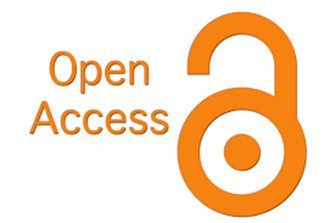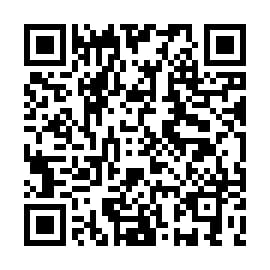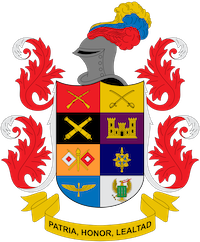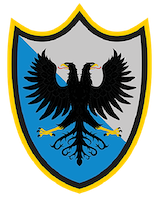Quality Policy
1. Editorial management
2. Conflict of interest
3. Code of ethics and good practices
4. Modifications in published articles
1. EDITORIAL MANAGEMENT
The Scientific Journal Perspectives in Intelligence seeks to extend the dissemination and scientific impact of investigation projects related to security and defense studies and strategic intelligence, from an interdisciplinary approach in social sciences. To this end, it employs clear and objective procedures for the selection, evaluation, publication and distribution of contents.
Likewise, the Scientific Journal Perspectives in Intelligence seeks the constant increase of national, regional and international visibility through the use of impact calculation metrics, inclusion in various indexing bases and the use of information and communication technologies.
2. CONFLICT OF INTEREST
Scientific Journal Perspectives in Intelligence requires that all participants in the publication process declare any potential conflicts of interest in the development or publication of their article. Examples of potential conflicts of interest directly or indirectly related to research include (but are not limited to) the following situations:
• Fees for participation in scientific events.
• Academic support to attend scientific events or educational programs.
• Employment or consulting contracts.
• Positions on boards of directors or advisory boards.
• Intellectual property rights on elements, patents, etc., used in or for the development of research.
• Financial interest in the research by themselves or close relatives.
3. CODE OF ETHICS AND GOOD PRACTICES
The Scientific Journal Perspectives in Intelligence adheres to the "Good Practice Guidelines for Journal Editors" and to the ethical provisions of the COPE (Committee On Publication Ethics), as well as to the provisions of the Statutory Data Habeas Law "Law 1266 of 2008-Law of Habeas Data" for the handling of personal data in databases.
a) Editors Responsibilities
1) Decision on the contents for publication. The Editors are responsible for the final decision on the contents to be published in the Scientific Journal Perspectives in Intelligence. This decision is made objectively, based on the concepts of the peer reviewers and without considerations about the profession, political orientation, gender, citizenship, race or sexual orientation, religious belief or language of the authors.
2) Confidentiality. The Editors, members of the Editorial Committee, Scientific Committee and editorial staff undertake not to disclose information about articles submitted to Scientific Journal Perspectives in Intelligence to anyone other than the author.
3) Communication. Communication with authors is done only by the Editors, through institutional e-mails and the OJS platform of the Scientific Journal Perspectives in Intelligence.
4) Disclosure of information and conflict of interest. The Editors, the members of the Editorial Committee, the Scientific Committee and the editorial team undertake not to use the content of the articles submitted to the Scientific Journal Perspectives in Intelligence for their own benefit, except with the explicit written consent of the author. Likewise, they will inform the Editors about any possible conflict of interest due to their relationship with any of the authors or institutions associated with the articles.
5) Solution of questions, complaints or claims. The Editors are responsible for receiving and resolving questions, complaints or claims regarding the contents of the Scientific Journal Perspectives in Intelligence, its editorial management and the publication process. Before making a final decision, the Editors may seek the advice of the members of the Editorial Committee and the Scientific Committee.
b) Responsibilities of the peer evaluators (reviewers)
1) Contribution to editorial decisions. Peer reviewers are committed to advise the Editors, the members of the Editorial Committee and the Scientific Committee to make objective decisions, based on their criteria and professional experience, about the articles submitted to the Scientific Journal Perspectives in Intelligence. Likewise, they will help authors to improve the quality of their articles with constructive suggestions.
2) Diligence. Peer reviewers must carefully process the articles assigned for review, notifying the Editors appropriately when they do not consider qualified to fulfill their task or when they consider they cannot complete it within the time assigned.
3) Confidentiality. Peer reviewers will not disclose information about articles submitted to Scientific Journal Perspectives in Intelligence.
4) Objectivity. Peer reviewers will objectively review the assigned articles and express their opinions with supporting arguments.
5) Bibliographic references. Peer reviewers will notify the Editors of cases in which they find content that has not been properly or correctly referenced in the assigned articles.
6) Reservation and conflict of interest. Peer reviewers undertake not to use the content of articles submitted to Scientific Journal Perspectives in Intelligence for their own benefit without the explicit written consent of the author. Likewise, they will inform the Editors about any possible conflict of interest as a result of connection with any of the institutions associated with the articles.
c) Responsibilities of the authors
1) Authorship. The main author is considered to be the person who submits the manuscript to Scientific Journal Perspectives in Intelligence through the OJS platform, unless otherwise indicated. For all purposes, this person will act on behalf of the other authors. The Scientific Journal Perspectives in Intelligence requires that authors have a minimum academic background at the undergraduate level and experience in their professional field.
The main author will guarantee that only those who have made a significant contribution to the design, execution and interpretation of the investigation developed will be listed as co-authors of the article. Likewise, he/she will verify that all authors approve the changes requested by the peer reviewers and the style and layout correction proofs, in case the article is accepted for publication.
2) Copyright and license for publication. Authors who publish their articles in the Scientific Journal Perspectives in Intelligence retain the moral rights to the article. For the publication of the article, the authors agree to assign their economic rights in favor of Scientific Journal Perspectives in Intelligence under a license Creative Commons: Attribution-NonCommercial-NoDerivatives 4.0 International.
Thus, authors and readers may copy and disseminate the article in the final version published online by Scientific Journal Perspectives in Intelligence, provided that the creator(s) of the article are acknowledged and identified, that no commercial use is made of the final published article, and that no derivative works or modified versions are involved.
This license also allows authors to self-archive their article in institutional repositories, thematic repositories or personal web pages in the final version published online, as long as this is done under the conditions mentioned above. To this end, the main author will ensure that all authors sign the declaration of originality and assignment of rights form as a final step for the publication of the article.
3) Data access. Authors should provide all the data used in the preparation of their article in order to be able to verify the validity of their results. Similarly, they must guarantee access to this information by other professionals, through a data repository or other direct means of contact, for a minimum period of five years from the publication of the article. If there is any limitation for confidentiality effects, it should be notified to the Editors at the time of submitting the article proposal to the Scientific Journal Perspectives in Intelligence.
4) Originality. Authors should only submit original, unpublished articles that have not been previously published and have not been submitted to other journals or editorial bodies. Authors will guarantee the correct citation and reference of all sources used in the writing of their article..
5) Code of conduct and editorial practices. Authors will certify that they have complied with the code of conduct and editorial practices of the Scientific Journal Perspectives in Intelligence, in order to evidence objectivity and transparency in their investigation. Likewise, they will follow the principles of professional ethics, identifying their sources of funding and possible conflicts of interest. If the investigation involved humans, information on informed consent should be included, as well as on the welfare of the animals if they were used.
6) Errors in content. Authors will immediately notify the Editors of significant errors or imprecisions in their published article, providing all the necessary collaboration for their correction, in accordance with the policy of corrections to published articles of the Scientific Journal Perspectives in Intelligence.
The Scientific Journal Perspectives in Intelligence subscribes to the code of ethics established by COPE (Committee on Publication Ethics). Likewise, it bases its actions on the Elsevier's Research and Publication Ethics Program (Ethics in Research & Publication program).
The Scientific Journal Perspectives in Intelligence employs the criteria of the international standard for COPE authors, as well as their flow diagrams to resolve cases of suspected malpractice. In addition, Scientific Journal Perspectives in Intelligence is a signatory to the San Francisco Declaration on Research Assessment (DORA) and adheres to its principles, recommendations and good practices.
4. MODIFICATIONS IN PUBLISHED ARTICLES
The Scientific Journal Perspectives in Intelligence ensures that all published content complies with the highest quality standards; for this reason, authors are contacted at least twice by the Editors to verify proofreading and layout of the articles. However, the amendments that the Journal may make to the published contents are divided in: a) erratum, b) corrections, c) retractions and d) deletions.
a) Erratum
Occasionally unintentional typographical errors occur in production; in this respect, Scientific Journal Perspectives in Intelligence agrees to make corrections to the printed content through an erratum in the following number, after the error has been detected. Corrections to the online content will be made through an addendum to the published article.
Errors that Scientific Journal Perspectives in Intelligence accepts to correct, after print or online publication of the contents, are as follows:
- Spelling errors in authors' names, institutional affiliation, e-mail or ORCID code.
- Spelling errors in the title, abstract, keywords, content and annexes of the article.
- Poor quality of tables or figures, or incorrect numbering.
Errors that Scientific Journal Perspectives in Intelligence does NOT accept to correct after print or online publication of content are as follows:
- Changes in authors (removal or inclusion of authors), institutional affiliations, acknowledgements, citations and references.
- Changes to the title, abstract, keywords, content and annexes of the article.
- Changes of tables or figures.
b) Corrections
Corrections are made when the authors detect errors after publication of the article that compromise the validity of the scientific content. Corrections are judged on their relevance to readers and on the negative impact on the integrity of the article as a result of subsequent information unknown to the authors at the moment of publication.
c) Retractions
The Scientific Journal Perspectives in Intelligence follows the COPE retraction guidelines and in the case of retractions, a document acknowledging unintentional or intentional inaccuracies in the paper is published; in the following cases:
- There is strong evidence that the findings are unreliable, either as a result of a major error (e.g., computational error or experimental error) or as a result of fabrication (e.g., data) or falsification (e.g., image manipulation).
- Constitutes plagiarism.
- Results have been previously published in another resource without proper attribution of sources or communication to the publisher, permission to republish, or justification (e.g., cases of redundant publication).
- Contains material or data without permission to use.
- Copyright has been infringed or there are other significant legal issues (e.g., defamation, privacy).
- It contains unethical research.
- The publication is the result of a compromised or manipulated peer review process.
- The author/authors did not declare a major conflict (i.e., conflict of interest) that, according to the editor, would have affected the interpretations, work, or recommendations of the editors and peer reviewers.
Retraction notices should:
- Be linked to the retracted article whenever possible (i.e., in all online versions).
- Clearly identify the retracted article (e.g., by including the title and authors in the heading of the retraction or by citing the retracted article).
- Be clearly identified as a retraction (i.e., distinct from other types of correction or comment).
- Be published promptly to minimize harmful effects.
- Be freely available to all readers (i.e., not behind barriers to access or available only to subscribers).
- Indicate who retracts the article
- Indicate the reason(s) for the retraction.
In the event of a retraction, the item will have a digital watermark with the word "Retracted".
d) Eliminations
The Scientific Journal Perspectives in Intelligence has a policy of not altering or deleting the published scientific register, in the interest that articles should remain unchanged as far as possible. However, an article may be removed when there is a legal decision that determines that:
- The privacy of a research subject has been inappropriately violated.
- The article contains errors that, if followed, would result in a risk to the general public.
- The article makes defamatory comments about others or their work.




